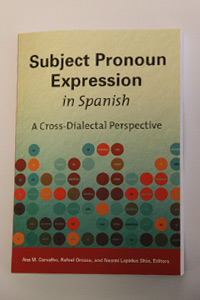Naomi Lapidus Shin
- Hispanic Linguistics
- Spanish in the United States
- Child language development
- Bilingualism
- Language contact
- Sociolinguistics
Questioning Theoretical Primitives in Linguistic Inquiry: Papers in honor of Ricardo Otheguy
Across the world, professional linguistic inquiry is in full bloom, largely as result of pioneering thinkers who helped rapidly modernize the study of human language in the last century. As the field continues to move forward, further solidifying its position as a conduit of insight into the human condition, it is essential to take stock of the theoretical primitives that have given linguistics its intellectual foundation. This volume does precisely that, inspecting the load-bearing components of the edifice upon which contemporary linguistics has been constructed. The volume’s authors – whose expertise spans the Generativist, Functionalist, and Variationist research traditions – remind us of the need to revisit the conceptual bedrock of the field, clarifying and assessing our primary theoretical moves, including those relating to such elemental components as the ‘linguistic sign’, ‘a language’, ‘structural relations’, ‘grammatical category’, ‘acquisition’, ‘bilingual’, ‘competence’, and ‘sociolinguistic variable’.Buy this book

Gramática española: Variación social
Gramática española: Variación social introduces intermediate to advanced students of Spanish to the main grammatical features of the language in a way that emphasizes the social underpinnings of language.
Written entirely in Spanish, this unique approach to the study of grammar guides students in an examination of how Spanish grammar varies depending on place, social group, and situation. Students examine why some varieties of Spanish are considered prestigious while others are not, drawing on current and historical sociopolitical contexts, all while learning grammatical terminology and how to identify categories and constructions in Spanish.
This is an excellent resource for students at level B1 or higher on the Common European Framework for Languages, and Intermediate High to Advanced High on the ACTFL proficiency scale.
Buy this book
Subject Pronoun Expression in Spanish: A Cross-Dialectal Perspective
Much recent scholarship has sought to identify the linguistic and social factors that favor the expression or omission of subject pronouns in Spanish. This volume brings together leading experts on the topic of language variation in Spanish to provide a panoramic view of research trends, develop probabilistic models of grammar, and investigate the impact of language contact on pronoun expression.
The book consists of three sections. The first studies the distributional patterns and conditioning forces on subject pronoun expression in four monolingual varieties―Dominican, Colombian, Mexican, and Peninsular―and makes cross-dialectal comparisons. In the second section, experts explore Spanish in contact with English, Maya, Catalan, and Portuguese to determine the extent to which each language influences this syntactic variable. The final section examines the acquisition of variable subject pronoun expression among monolingual and bilingual children as well as adult second language learners.
Buy this book
Buy Subject Pronoun Expression in Spanish: A Cross-Dialectal Perspective on Amazon

